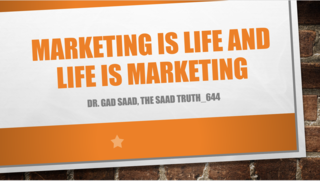Consumer Behavior
Marketing Is Life and Life Is Marketing
I consume, therefore I am.
Posted May 7, 2018 Reviewed by Ekua Hagan

In the introduction of my 2007 book, The Evolutionary Bases of Consumption, I define “consumer behavior” in a much more all-encompassing manner than is typically presumed. We don’t solely consume Starbucks, Coca-Cola, and McDonald’s. Nearly everything that defines much of our daily experiences is consumptive in nature. Yes, we consume products and services. But we also consume life experiences, religious narratives, art, literature, and ideas. Our close friendships, marriages, business relationships along with countless life-marking moments (from the birth of our children to the death of loved ones) are laden with endless forms of consumer-related rituals.
As I state in my 2011 book, The Consuming Instinct, the operative motto that looms over our existence is “I consume, therefore I am.” To study consumer behavior is to explore human nature at its most fundamental level using the modern world as its backdrop. And the process of understanding our consumptive nature involves all of the functional areas that psychologists typically are interested in including perception. learning, memory, persuasion, motivation, affect, attitude formation, decision-making, personality, and culture.
Consumer behavior is truly where innumerable academic disciplines meet. Here are some examples off the top of my head:
- History: Do fashion trends (e.g., skirt length) map onto macroeconomic realities?
- Clinical Psychology: Are there demographic variables that best predict who is likely to succumb to compulsive buying, eating disorders, pornographic addiction, or pathological gambling?
- Microeconomics: What are some psychological processes that might help explain which products are price elastic or price inelastic? [Robert Lustig recently offered some compelling insights linking dopamine, serotonin, and price elasticity; see our recent conversation.]
- Macroeconomics: Which macro indicators best correlate with consumer wellbeing and quality of life measures?
- Biology and Engineering: Using biomimicry for optimal product design.
- Cognitive psychology: The manner by which consumers learn, store, and retrieve product information. When have consumers acquired sufficient product information to make a choice?
- Social and personality psychology: How does the need to belong or the need to conform manifest itself in the consumer setting? More generally, how do specific personality traits impact our behaviors as consumers?
- Sociology: The process by which opinion leaders diffuse new consumer fads in a social circle.
- Medicine: Exploring how many non-communicable diseases are rooted in poor consumer choices. See the mini-summit on the marketing of health promotion that I recently organized and hosted at Concordia University.
- Cultural psychology: Are there specific cultural values that help us predict the diffusion rate of new products in global markets?
- Evolutionary psychology: How do women’s menstrual cycles affect their consumer choices?
- Neurosciences: Examining the neural activation patterns of consumers when they are exposed to rational versus emotional ad appeals.
Marketing is fundamental to what makes us human. Marketing is not solely about selling chewing gum, cars, cellphones, and tourist packages. Everything in life involves the process of marketing something to someone. We market ourselves in the mating market. We market ourselves in the labor market. We market ourselves online via our personal webpages and social media portals. We market ourselves to new prospective friends. We market our ideas to book publishers, venture capitalists, coworkers, and academic reviewers. As members of a social species endowed with large brains, we are natural-born marketers. Capitalism, the economic system that has elevated innumerable people out of abject poverty and misery, is founded on marketing. Everything that defines your daily existence has the indelible marks of marketing on it.
Consumer researchers are typically professors of marketing housed in business schools. This often leads to an erroneous folk understanding of what marketing, as a scientific discipline, entails. The problem stems from a conflation of the broad use of the term “marketing” as a daily (and at times mundane) practice versus the use of the term as an academic field of study.
Garage bands, food trucks, and party planners engage in marketing. This does not mean that professors of marketing sit around designing promotional flyers for garage bands, food trucks, and all-night parties! Marketing as an academic discipline is where several cognate disciplines meet including psychology, economics, and applied mathematics. Most marketing PhDs obtain much of their training either as behavioral scientists or as quantitative modelers. To the extent that the market is a strong indicator of the real-world value of one’s training, it is no surprise that professors of marketing are some of the best-paid academics for they use their rigorous training to tackle many important issues that define our social and economic realities.
I’ve always been interested in consilience, the quest for unity of knowledge. This is precisely why I decided to pursue my Ph.D. in the area of consumer behavior with a focus on the psychology of decision-making, and eventually to my founding the field of evolutionary consumption. We are consumptive animals who spend our lives making decisions as shaped by our shared biological heritage. It is difficult to imagine a more enthralling area of scientific pursuit.
It is indeed the case that marketing is life and life is marketing. Cheers.
Note: This was also released as THE SAAD TRUTH_644.


